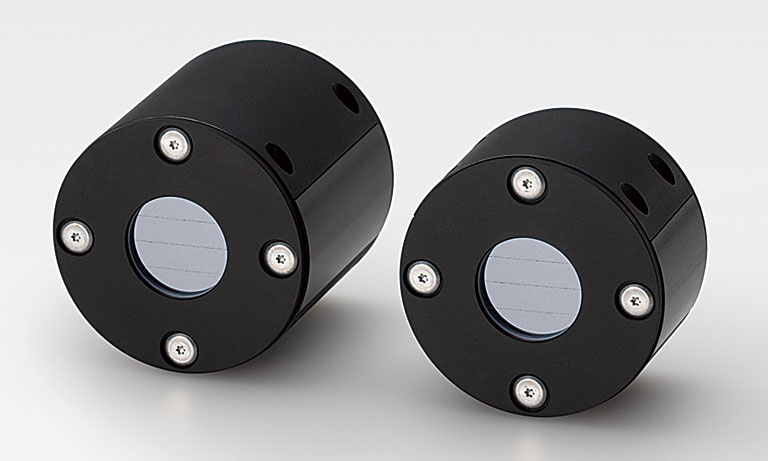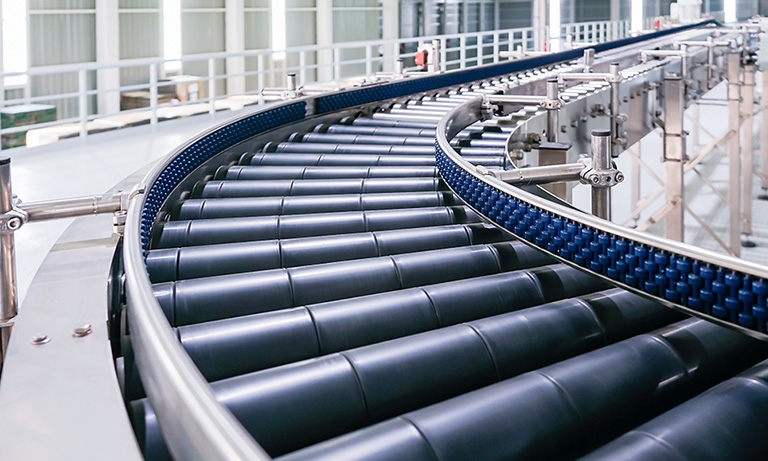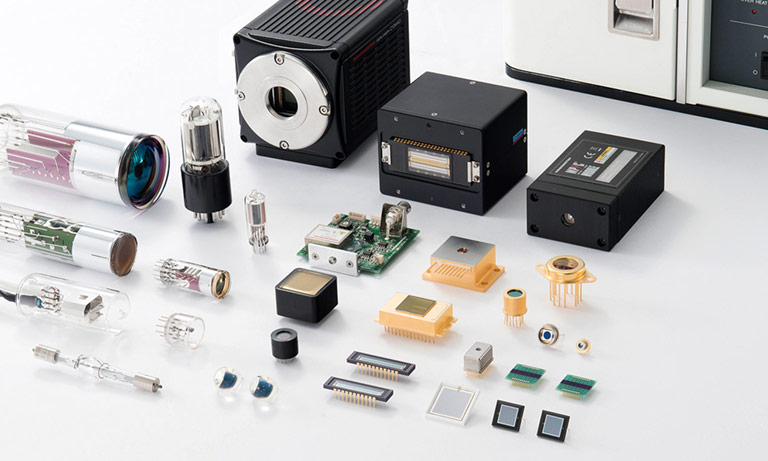Select your region or country.
OPD/OLED
“柔性”光电器件
技术概述
使用有机半导体的光电器件因其轻薄、灵活性等独特的特点而备受关注。通常,半导体器件由以硅为代表的无机材料组成。一方面,由于无机材料的刚性,用其制造“柔性”器件基本上是困难的。另一方面,有机半导体可以在 100 nm 的薄膜中工作,并且可以通过印刷或蒸发等普通处理技术在塑料或超薄玻璃薄膜等柔性基板上形成。针对有机光电器件,我们已研究作为光电传感器的有机光电二极管 (OPD) 和作为光源的有机发光二极管 (OLED)。

图 1:有机光电器件

图 2:OPD 和 OLED 的工作机理
有机光电器件的基本结构和工作机理如下。OPD 和 OLED 的结构都很简单,其中有机半导体夹在阳极和阴极之间。在 OPD 中,有机层包括电子供体分子和受体分子。当这些分子吸收光子时,会产生静电耦合的电子空穴对,称为激子。激子扩散到供体-受体接口,并解离成自由载体。最后,在每个电极处收集孔和电子,并将其检测为电信号。由于有机半导体在本质上具有与绝缘体相似的特性,因此有机层需要非常薄。这种结构表明,OPD 沿垂直(厚度)方向具有导电性,而沿水平轴方向具有高电阻。这进而表明,与传统的无机器件相比,几乎没有观察到电串扰。此外,有机半导体在薄膜中显示出很高的光电变换效率,因为光吸收系数较高。此特性也支持有机材料用作薄器件的适用性。
另一方面,在 OLED 中,从每个电极注入的孔和电子在发光的有机分子中再结合,并且观察到光发射。借助使用透明电极和简单制造工艺的夹层结构,OLED 适用于大面积表面发射光源。这可以实现高照明均匀度和优选的图案设计。
用途
我们已开发在近红外 (NIR) 区域具有感光灵敏度的柔性 OPD。800 nm 左右的波长范围被称为“生物光学窗口”,因为水或血红蛋白 (Hb) 等生物成分在 NIR 区域的吸光度较低。因此,光的散射比吸收更明显,我们可以获得有关活体的各种信息。我们的目标是将柔性 OPD 应用于生物传感设备,以降低测量中的压力。

图 3 (a):柔性 OPD

图 3 (b):光谱灵敏度特性

图 4:生物光学窗口
我们还展示了具有任意发射模式的大面积 NIR-OLED。我们的 NIR-OLED 即使在高电流密度下工作也具有极高的运行稳定性,此外,辐射功率仅 1 mW。利用表面发射器件,我们可以为传感或暗场观测应用提供能够均匀照射目标的光源,其前景非常广阔。
■我们的 OLED 的 NIR 图像

图 5:发射光谱

图 6 (a):传统 LED

图 6 (b):表面发射 OLED
*T. Yamanaka, H. Nakanotani, S. Hara, T. Hirohata, C. Adachi, “Near-infrared organic light-emitting diodes for biosensing with high operating stability,” Appl. Phys. Express 10, 074101 (2017).
- Confirmation
-
It looks like you're in the . If this is not your location, please select the correct region or country below.
You're headed to Hamamatsu Photonics website for (Chinese). If you want to view an other country's site, the optimized information will be provided by selecting options below.
In order to use this website comfortably, we use cookies. For cookie details please see our cookie policy.
- Cookie Policy
-
This website or its third-party tools use cookies, which are necessary to its functioning and required to achieve the purposes illustrated in this cookie policy. By closing the cookie warning banner, scrolling the page, clicking a link or continuing to browse otherwise, you agree to the use of cookies.
Hamamatsu uses cookies in order to enhance your experience on our website and ensure that our website functions.
You can visit this page at any time to learn more about cookies, get the most up to date information on how we use cookies and manage your cookie settings. We will not use cookies for any purpose other than the ones stated, but please note that we reserve the right to update our cookies.
1. What are cookies?
For modern websites to work according to visitor’s expectations, they need to collect certain basic information about visitors. To do this, a site will create small text files which are placed on visitor’s devices (computer or mobile) - these files are known as cookies when you access a website. Cookies are used in order to make websites function and work efficiently. Cookies are uniquely assigned to each visitor and can only be read by a web server in the domain that issued the cookie to the visitor. Cookies cannot be used to run programs or deliver viruses to a visitor’s device.
Cookies do various jobs which make the visitor’s experience of the internet much smoother and more interactive. For instance, cookies are used to remember the visitor’s preferences on sites they visit often, to remember language preference and to help navigate between pages more efficiently. Much, though not all, of the data collected is anonymous, though some of it is designed to detect browsing patterns and approximate geographical location to improve the visitor experience.
Certain type of cookies may require the data subject’s consent before storing them on the computer.
2. What are the different types of cookies?
This website uses two types of cookies:
- First party cookies. For our website, the first party cookies are controlled and maintained by Hamamatsu. No other parties have access to these cookies.
- Third party cookies. These cookies are implemented by organizations outside Hamamatsu. We do not have access to the data in these cookies, but we use these cookies to improve the overall website experience.
3. How do we use cookies?
This website uses cookies for following purposes:
- Certain cookies are necessary for our website to function. These are strictly necessary cookies and are required to enable website access, support navigation or provide relevant content. These cookies direct you to the correct region or country, and support security and ecommerce. Strictly necessary cookies also enforce your privacy preferences. Without these strictly necessary cookies, much of our website will not function.
- Analytics cookies are used to track website usage. This data enables us to improve our website usability, performance and website administration. In our analytics cookies, we do not store any personal identifying information.
- Functionality cookies. These are used to recognize you when you return to our website. This enables us to personalize our content for you, greet you by name and remember your preferences (for example, your choice of language or region).
- These cookies record your visit to our website, the pages you have visited and the links you have followed. We will use this information to make our website and the advertising displayed on it more relevant to your interests. We may also share this information with third parties for this purpose.
Cookies help us help you. Through the use of cookies, we learn what is important to our visitors and we develop and enhance website content and functionality to support your experience. Much of our website can be accessed if cookies are disabled, however certain website functions may not work. And, we believe your current and future visits will be enhanced if cookies are enabled.
4. Which cookies do we use?
There are two ways to manage cookie preferences.
- You can set your cookie preferences on your device or in your browser.
- You can set your cookie preferences at the website level.
If you don’t want to receive cookies, you can modify your browser so that it notifies you when cookies are sent to it or you can refuse cookies altogether. You can also delete cookies that have already been set.
If you wish to restrict or block web browser cookies which are set on your device then you can do this through your browser settings; the Help function within your browser should tell you how. Alternatively, you may wish to visit www.aboutcookies.org, which contains comprehensive information on how to do this on a wide variety of desktop browsers.
5. What are Internet tags and how do we use them with cookies?
Occasionally, we may use internet tags (also known as action tags, single-pixel GIFs, clear GIFs, invisible GIFs and 1-by-1 GIFs) at this site and may deploy these tags/cookies through a third-party advertising partner or a web analytical service partner which may be located and store the respective information (including your IP-address) in a foreign country. These tags/cookies are placed on both online advertisements that bring users to this site and on different pages of this site. We use this technology to measure the visitors' responses to our sites and the effectiveness of our advertising campaigns (including how many times a page is opened and which information is consulted) as well as to evaluate your use of this website. The third-party partner or the web analytical service partner may be able to collect data about visitors to our and other sites because of these internet tags/cookies, may compose reports regarding the website’s activity for us and may provide further services which are related to the use of the website and the internet. They may provide such information to other parties if there is a legal requirement that they do so, or if they hire the other parties to process information on their behalf.
If you would like more information about web tags and cookies associated with on-line advertising or to opt-out of third-party collection of this information, please visit the Network Advertising Initiative website http://www.networkadvertising.org.
6. Analytics and Advertisement Cookies
We use third-party cookies (such as Google Analytics) to track visitors on our website, to get reports about how visitors use the website and to inform, optimize and serve ads based on someone's past visits to our website.
You may opt-out of Google Analytics cookies by the websites provided by Google:
https://tools.google.com/dlpage/gaoptout?hl=en
As provided in this Privacy Policy (Article 5), you can learn more about opt-out cookies by the website provided by Network Advertising Initiative:
http://www.networkadvertising.org
We inform you that in such case you will not be able to wholly use all functions of our website.
Close

































































































